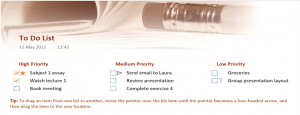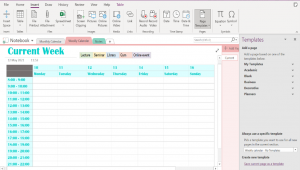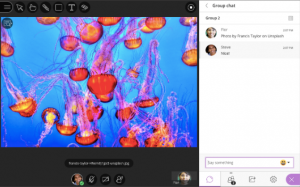Written by Sophia Leaper, previous Student Digital Champion.
Since I started my degree I have gone through a selection of note taking methods, from loose papers filed in binders (that rarely actually ended up in binders) to paper notebooks and presentation printouts, I always ended up with a clutter of sheets that rarely got used for exam prep. Then I found OneNote, it didn’t immediately revolutionise my productivity, in fact at the start I ended up with an annoying combination of paper and digital notes that I didn’t know what to do with. However, as exams approached, I realised how convenient it was that I already had half of my essay points written down digitally. OneNote allows a format where I could just copy and paste specific points to form an argument, I could make tables with agree and disagree columns and I could add text wherever I chose to. Slowly I came to rely on it not only for all my note taking but also as an organisation tool, I can create monthly, weekly and daily calendars that can be updated instantly and tasks lists that are easy to tick off and prioritise.

Its features are endlessly customisable and you can divide your document pages into notebooks, section and pages for a clean and organised look. For those with tablets or touchscreens it is also easily allows you to download and annotate presentation slides and add your own handwritten notes. There are many useful features that OneNote contains, here I will mention my top six favourites.
My top OneNote features:
Create a shared set of notes.
You can share your notebooks with friends and peers, each of you can have a different section or topic or you can choose to all collaborate on the same thing. This also works well if you link your OneNote to your Outlook account as it is all part of Microsoft 365 which comes with your University account.
Timetabling
You can use the table feature to create your own customisable calendar or download a template online. You can choose the amount or rows and columns to adjust to your working hours and can change fonts and colours in order to make your timetable more aesthetic and colour-coded.

Export your notes as a PDF
You can convert annotated slides, notes with diagrams, or essay plans into PDFs and print them out to study from.
Draw
If you have a tablet or a smart pen you can draw your own diagrams and then place text boxes around the image for labels. OneNote can also convert handwritten text into typed format, so if you don’t feel that comfortable typing you can still get organised typed text through OneNotes’ ‘ink to text’ tool
Multiple windows
You can open multiple windows and use split screen to look at them both. That way you can have your notes on one side and your essay plan on the other!
Insert Excel spreadsheets
Using the insert button at the top of OneNote you can insert and view excel spreadsheet sections as well as file printouts, attachments and screen clippings.
Further information
For more information on using the O354 suite on your computer please see the IT Services webpages. You can also view their Introduction to OneNote page there too.





 As we were thrown into the deep-end of online learning during the covid-19 pandemic, a new phrase appeared in our vocabulary: breakout rooms. As the concept of breakout rooms emerged, it picked up a rather negative stigma among students. Virtually entering a small room with fellow students, who may or may not sit there in silence for 25 minutes, became a daunting prospect.
As we were thrown into the deep-end of online learning during the covid-19 pandemic, a new phrase appeared in our vocabulary: breakout rooms. As the concept of breakout rooms emerged, it picked up a rather negative stigma among students. Virtually entering a small room with fellow students, who may or may not sit there in silence for 25 minutes, became a daunting prospect.

 As time went on, you’d expect that students would get used to breakout rooms and be more willing to participate. However, stigma surrounding them built, so where do we go from here? Options include scrapping them all together; some of the most engaging online seminars I’ve had this year have been whole group discussions on Zoom, facilitated by our tutor who encouraged contribution from all students. Alternatively, we can re-consider the purpose of breakout rooms and the opportunities they present us. Online learning was an experience we never expected to find ourselves in and the short time frame we had to get used to it has left a number of warped opinions on the digital learning environment. It is unclear what the next academic year will look like but breakout rooms will likely prevail in some shape or form and it is important we look for the benefits in them.
As time went on, you’d expect that students would get used to breakout rooms and be more willing to participate. However, stigma surrounding them built, so where do we go from here? Options include scrapping them all together; some of the most engaging online seminars I’ve had this year have been whole group discussions on Zoom, facilitated by our tutor who encouraged contribution from all students. Alternatively, we can re-consider the purpose of breakout rooms and the opportunities they present us. Online learning was an experience we never expected to find ourselves in and the short time frame we had to get used to it has left a number of warped opinions on the digital learning environment. It is unclear what the next academic year will look like but breakout rooms will likely prevail in some shape or form and it is important we look for the benefits in them.